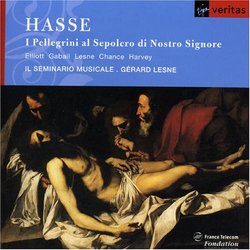| All Artists: Johann Adolf Hasse, Gérard Lesne, Rachel Elliott, Valérie Gabail, Michael Chance, Peter Harvey, Pascal Monteilhet, Il Seminario musicale Title: Hasse - I Pellegrini al Sepolero di Nostro Signore / R. Elliott, Gabail, Chance, Lesne, Harvey, Il Seminario musicale, Lesne Members Wishing: 0 Total Copies: 0 Label: EMI Import Release Date: 12/23/2002 Album Type: Import Genres: Pop, Classical Styles: Vocal Pop, Opera & Classical Vocal, Historical Periods, Baroque (c.1600-1750), Early Music Number of Discs: 1 SwapaCD Credits: 1 UPC: 724354532924 |
Search - Johann Adolf Hasse, Gérard Lesne, Rachel Elliott :: Hasse - I Pellegrini al Sepolero di Nostro Signore / R. Elliott, Gabail, Chance, Lesne, Harvey, Il Seminario musicale, Lesne
CD Details |
CD ReviewsGreat story and great music hcf | 05/13/2001 (5 out of 5 stars) "Buy this at once! Virgin Veritas releases go out of print unpredictably fast. If you miss this you'll be sorry. This is a short oratorio in two parts. The plot tells a story of four male pilgrims - two sopranos (sung here by women, originally by castrati) and two altos - who go on a pilgrimage to Jesus's tomb in Jerusalem. Once there, they're taken to the tomb by a guide (bass). The guide expresses the spiritual gist of the story, sort of like a evangelist. The first part of the oratorio is full of anticipation and rejoicing as the pilgrims approach the tomb. This part closes with a wonderful five-part ensemble Lauda (no translation necessary). The second part of the oratorio is a mini-passion as the pilgrims relive Jesus's life and death inside the tomb. The guide's aria D'Aspri Legato (which commemorates Jesus's suffering under the whip of a roman soldier) is especially moving. Wonderful melodies abound. Some of the recitatives are accompagnato and thus are much more engaging than regular secco recitatives. The final five-part ensemble expresses the moral of the story: on earth man is a pilgrim, and he can only find peace when he turns his steps and thoughts to god. (I'm not trying to preach to anyone here: I'm just repeating what's in the libretto). The words "when he turns to god" are given not to the entire chorus but to an SSA trio, for emphasis. I'm not a huge fan of Hasse but this oratorio probably has his most magnificent music. The singers are great. Gerard Lesne is excellent as usual (I don't think I've ever been disappointed by Lesne, he's one of the most reliable singers out there). Michael Chance makes a memorable contribution, even though his character is the only one without an aria. Both sopranos are delightful. Peter Harvey as the guide nearly steals the show, even though he only has one aria (the already mentioned D'Aspri Legato). In this aria, Harvey brings the form of da capo aria to its total triumph: the ornaments are textbook perfect. Don't hesitate: buy! gggimpy@yahoo.com" Wonderful oratorio J. Luis Juarez Echenique | Mexico City | 06/21/2001 (5 out of 5 stars) "If there are 2 great XVIII Century composers who deserve to be far better known, they are Johann Adolf Hasse and Niccoló Jommelli, so it is a great joy that Gérard Lesne decided to revive this extremely beautiful oratorio. The recording is exemplary in every way, if you have never heard Gérard Lesne, let me tell you that I think he is the greatest countertenor alive. His voice may not be as ravishing as Andreas Scholl's (but RAVISHING it is), but I think he is the more interesting and imaginative artist. His work with Il Seminario Musicale has been a source of joy for many years and should be better known in America. Do please try this and any other recording with Gérard Lesne, you will be very sorry if you miss these valuable recordings." More Hasse please! Christian V. Pampinella | Bloomington, IN | 11/28/2004 (5 out of 5 stars) "This recording is a real gem, especially since Hasse is so rarely recorded. An excellent performance from all the vocalists, although some may find Gerard Lesne's voice to be an acquired taste. The continuo group realizes their role with great dramatic effectiveness, and Il Seminario Musicale (as usual) sounds superb - Highly recommended."
|


 Track Listings (18) - Disc #1
Track Listings (18) - Disc #1